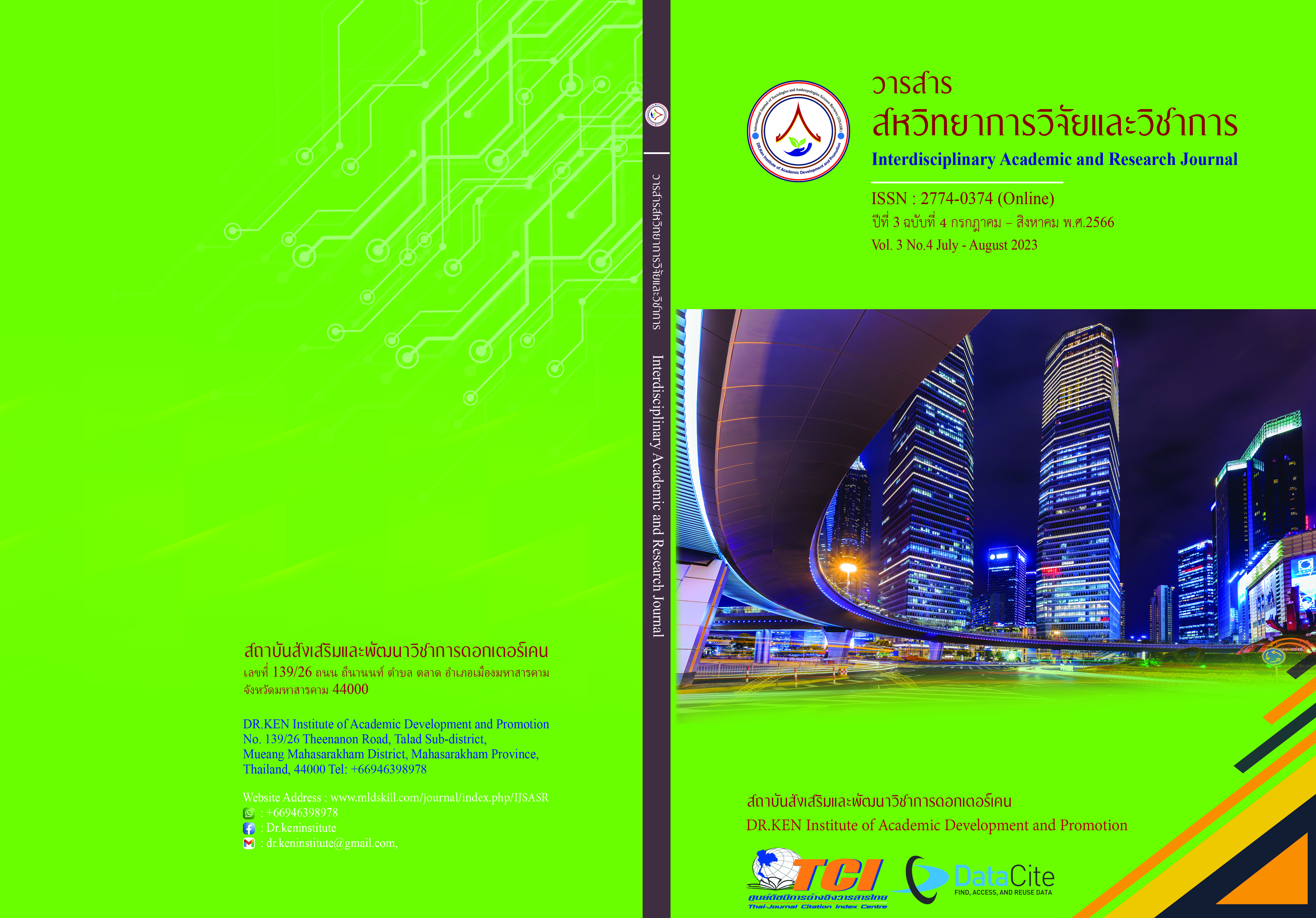Guidelines for Monitoring the Implementation of Annual Action Plan of Primary Educational Service Area Office by Applying of Empowerment Evaluation
DOI:
https://doi.org/10.14456/iarj.2023.228Keywords:
Empowerment Evaluation; , Monitoring; , Action Plan; , Primary Educational Service Area OfficeAbstract
Monitoring the implementation according to the annual action plan of the Primary Educational Service Area Office is an important process that helps increase the efficiency of operations to achieve specific operational goals. This research aims to 1) study the implementation according to the annual action plan of the Primary Educational Service Area Office with good performance, 2) develop guidelines for monitoring the implementation according to the annual action plan of the Primary Educational Service Area Office, applying the empowerment evaluation, and 3) check the quality of the developed guidelines. There are 3 phases in this research. Phase 1 is monitoring the implementation according to the annual action plan of the Primary Educational Service Area Office with good performance. Ten participants were interviewed in this phase. Phase 2 is the guideline development for monitoring the implementation according to the annual action plan. A focus group discussion with 9 experts was applied for this phase. Phase 3 is the quality check on the guidelines. Three hundred fifty-four participants were interviewed using interview forms, focus group discussions, and questionnaires. The data statistics were achieved using percentage, frequency distribution, mean standard deviation, and content analysis. The results show that 1) there are 5 monitoring principles, 4 groups of stakeholders, 4 main strategies and 23 sub-strategies of monitoring methods/strategies, 3 monitoring tools, and 17 evidence traces in operating check from monitoring the implementation according to the annual action plan of the Primary Educational Service Area Office with good performance. 2) There are 7 guidelines for monitoring the implementation according to the annual action plan of the Primary Educational Service Area Office applying the empowerment evaluation. They consist of 1) 3 sub-objectives of monitoring, 2) 5 monitoring principles, 3) the content framework of monitoring with 4 main issues and 22 subpoints, 4) 4 indicators of monitoring, 5) 4 groups of stakeholders, 6) 1 monitoring tool, and 7) 4-step monitoring process and 2 tactics. 3) The quality of guidelines for monitoring the implementation according to the annual action plan of the Primary Educational Service Area Office, applying the empowerment evaluation, shows utilization standards, feasibility standards, suitability standards, and accuracy standards at a high level in all aspects.
References
ณัฎฐ์ณพัชร์ อ่อนตาม. (2562). เทคนิคการบริหารงานแบบ PDCA (Deming Cycle). วารสารสมาคมพัฒนาวิชาชีพการบริหารการศึกษาแห่งประเทศไทย, 1(3), 44-45.
ณัฐพล ธิตินานันทกูล. (2563). การพัฒนาระบบการประกันคุณภาพการศึกษาของสถานศึกษาอาชีวศึกษาเอกชน โดยการประยุกต์ใช้พหุแนวคิด ตามมาตรฐานการอาชีวศึกษา พ.ศ. 2561 :มาตรฐานคุณลักษณะของผู้สำเร็จการศึกษาอาชีวศึกษาที่พึงประสงค์. วิทยานิพนธ์ปริญญาปรัชญาดุษฎีบัณฑิต. มหาวิทยาลัยศรีนครินทรวิโรฒ.
ณัฐวัชร จันทโรธรณ์ และพงษ์ศักดิ์ พัวพรพงษ์ . (2563). ประสิทธิผลขององค์กร. วารสารวิชาการ มหาวิทยาลัยนอร์ทกรุงเทพ, 9(2),1-9.
โทซาวะ บุนจิ. (2544). คิดใหม่ทำใหม่ด้วยไคเซ็น (ผู้แปล ชไมพร สุธรรมวงศ์). กรุงเทพฯ: สมาคมส่งเสริมเทคโนโลยี (ไทย-ญี่ปุ่น).
พรรณิภา ภูกองพลอย, ทัศน์ศิรินทร์ สว่างบุญ,วราพร เอราวรรณ์. (2561). มโนทัศน์เบื้องต้นของการประเมินอภิมาน. วารสารการวัดผลการศึกษา มหาวิทยาลัยมหาสารคาม, 24(1), 1-11.
เพ็ญศรี บุญเดช. (2561). การพัฒนาระบบการกำกับติดตามและประเมินแบบเสริมสร้างพลังอำนาจในการจัด การเรียนรู้ของครู สังกัดองค์กรปกครองส่วนท้องถิ่น. วารสารบัณฑิตศึกษา, 15(70), 9-17.
เรืองวิทย์ เกษสุวรรณ. (2545). การจัดการคุณภาพ:จาก TQC ถึง TQM,ISO 9000 และการประกันคุณภาพ. กรุงเทพฯ: บพิธการพิมพ์.
ศิริชัย กาญจนวาสีและคณะ. (2559). การเลือกใช้สถิติที่เหมาะสมสำหรับการวิจัย. พิมพ์ครั้งที่ 7. กรุงเทพฯ: โรงพิมพ์แห่งจุฬาลงกรณ์มหาวิทยาลัย
สำนักงานคณะกรรมการข้าราชการครูและบุคลากรทางการศึกษา กระทรวงศึกษาธิการ. (2565). กรอบอัตรากำลัง.Retrieved on 21 March 2022 from https://otepc.go.th/th/inform-services/2018-12-19-01-28-26.html
สำนักงานเลขาธิการสภาการศึกษา. (2555). รายงานการวิจัยและพัฒนารูปแบบการพัฒนาครูและผู้บริหารสถานศึกษาแบบใช้โรงเรียนเป็นฐานในโรงเรียนขนาดเล็ก : จังหวัดตาก. กรุงเทพฯ: บริษัท พริกหวานกราฟฟิค จำกัด.
สำนักงานเลขาธิการสภาการศึกษา. (2560). แผนการศึกษาแห่งชาติ พ.ศ. 2560 - 2579. กรุงเทพฯ บริษัท พริกหวานกราฟฟิค จำกัด.
สำนักติดตามและประเมินผลการจัดการศึกษาขั้นพื้นฐาน. (2563). รายงานสรุปผลการติดตามและประเมินผลการบริหารและการจัดการศึกษาขั้นพื้นฐานตามตัวชี้วัดแผนปฏิบัติราชการของสำนักงานคณะกรรมการการศึกษาขั้นพื้นฐาน ประจำปีงบประมาณ พ.ศ. 2563. กรุงเทพฯ: ห้างหุ้นส่วนจำกัด เอ็น.เอ.รัตนะเทรดดิ้ง.
สุนทร เกิดแก้ว. (2558). การบริหารโครงการ:การติดตาม ควบคุมและการประเมินผล. กรุงเทพฯ: เสมาธรรม.
สุภาพร พิศาลบุตร. (2549). การวางแผนและบริหารโครงการ. พิมพ์ครั้งที่ 5. กรุงเทพฯ: มหาวิทยาลัยราชภัฏสวนดุสิต.
สุวิมล ติรกานันท์. (2547). การประเมินโครงการ:แนวทางสู่การปฏิบัติ. กรุงเทพฯ: จุฬาลงกรณ์มหาวิทยาลัย.
สุวิมล ว่องวานิช. (2543). การวิจัยและพัฒนาระบบการประเมินผลภายในของสถานศึกษา. กรุงเทพฯ: จุฬาลงกรณ์มหาวิทยาลัย.
อมาวสี อัมพันศิริรัตน์. (2560). การประเมินแบบเสริมพลัง: แนวคิดและการประยุกต์ใช้. วารสาร (เครือข่ายวิทยาลัยพยาบาลและการสาธารณสุขภาคใต้), 4(1), 280-291.
ฮิโตชิ คูเบะ. (2540). การบริหารคุณภาพ (Management by quality (MBQ)) (ผู้แปล ปรีชา ลีลานุกรม,กิตติศักดิ์ พลอยพานิชเจริญ). กรุงเทพฯ: สมาคมส่งเสริมเทคโนโลยี (ไทย-ญี่ปุ่น).
Asia-Pacific Programed of Education for All. (1999). Monitoring and Evaluation of Literacy and Continuing Education Program: Practitioners’ manual. Retrieved on 1 January 2020 from https://files.eric.ed.gov/fulltext/ED438428.pdf
Bamberger, M., & Hewitt, E. (1986). Monitoring and Evaluating Urban Development Programs: Handbook for Program Managers and Researchers. Retrieved on 26 January 2020 from http://documents1.worldbank.org/curated/en/380361468137717922/pdf/multi-page.pdf
Cameron, K.S., & Quinn, R.E. (2002). Diagnosing and Changing Organization Culture. Massachusetts: Addison-Wesley.
Fetterman, D. M. (2001). The foundation of empowerment evaluation. Thousand Oaks, CA: SAGE Publications.
Fetterman, D. M., & Wandersman, A. (2005). Empowerment Evaluation Principles in Practice. Retrieved on 25 January 2020 from https://books.google.co.th/books?hl=th&lr=&id=zYDeAFbCRLsC&o
McMillan, J.H., & Schumacher, S.S. (1997). Research in Education: A Conceptual Introduction. Longman, New York.
Downloads
Published
How to Cite
Issue
Section
License
Copyright (c) 2023 Teerawan Bunbamrung, Taviga Tungprapa, Ong-art Naiyapatana

This work is licensed under a Creative Commons Attribution-NonCommercial-NoDerivatives 4.0 International License.
Copyright on any article in the Interdisciplinary Academic and Research Journal is retained by the author(s) under the under the Creative Commons Attribution-NonCommercial-NoDerivatives 4.0 International License. Permission to use text, content, images, etc. of publication. Any user to read, download, copy, distribute, print, search, or link to the full texts of articles, crawl them for indexing, pass them as data to software, or use them for any other lawful purpose. But do not use it for commercial use or with the intent to benefit any business.
















.png)


